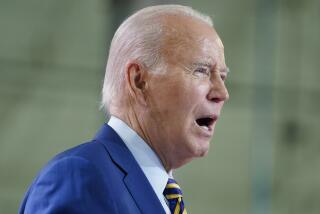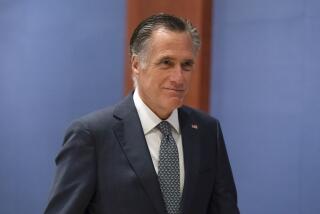A vow to cut healthcare spending
- Share via
WASHINGTON — Leading health industry groups have agreed to slow the explosive growth of healthcare spending, according to administration officials and others knowledgeable about the agreement.
Hospitals, drug makers and doctors, among others, wrote a letter to President Obama outlining their plan, which estimates $2 trillion in savings over the next decade.
The letter lacks much detail but suggests savings could come from simplified billing, restructuring the way hospitals are paid and using more information technology, among other steps.
Obama plans to promote the letter at a White House event today.
Although the agreement does not outline any industry commitments to accept specific reductions in revenue, it does signal continued engagement by powerful healthcare interests in the Obama administration’s effort to overhaul the nation’s troubled healthcare system.
Several industry groups -- including insurers, whose lobbying group signed the letter -- played central roles in defeating earlier efforts to reshape the system, including the Clinton administration’s push in the mid-1990s. Now, they may benefit by helping to shape any legislative package that emerges in the coming months. Insurers, for instance, oppose a government-coverage option, which they view as a potential rival.
Signatories include the American Medical Assn.; the American Hospital Assn.; the Pharmaceutical Research and Manufacturers of America; the Advanced Medical Technology Assn., which represents device makers; America’s Health Insurance Plans, which represents insurers; and the Service Employees International Union, which shepherded the agreement.
Many members of those groups, whose leaders have been working for weeks behind closed doors on the letter, could lose some money if healthcare spending were substantially slowed.
But as the nation’s healthcare tab consumes an ever greater share of the economy, controlling costs has become a central priority for policymakers in Washington. It has also emerged as perhaps the greatest challenge facing those trying to reshape the way healthcare is delivered in America.
Spending on healthcare reached $2.2 trillion in 2007 and is expected to increase by more than 6% a year, on average, over the next decade, faster than the economy’s growth in general, according to the federal Centers for Medicare and Medicaid Services.
In their letter, the groups estimate that they could slow the annual growth rate by an average of 1.5 percentage points over the next decade, although savings probably would vary in each year.
That could mean enormous savings to the economy and the federal government, a point highlighted Sunday by senior administration officials.
“Healthcare costs will continue to rise,” said one official, who was not authorized to speak for attribution. “But achieving a slowdown in the rate at which they increase would be a huge accomplishment in terms of freeing up resources for other priorities and in terms of relieving pressure on the federal budget.”
In addition to its rosy fiscal promise, the letter also comes at an important political moment for the president and his allies.
Congressional Democrats are intensifying their efforts to develop healthcare legislation in the face of gathering opposition from conservatives warning of a drift toward government-run healthcare.
Republican lawmakers last week received a briefing from an influential GOP political strategist about how to challenge the administration’s healthcare initiative, raising concerns among some Democrats on Capitol Hill.
On Sunday, administration officials were quick to hail the letter, calling it a “game changer” that illustrated the momentum behind the president’s healthcare campaign,
The letter also drew praise from AARP public policy director John Rother, a veteran of past healthcare overhaul efforts.
“While serious questions remain about the details, AARP believes the agreement of providers to slow the skyrocketing cost of healthcare is critical for the health reform we are all working toward,” Rother said in a statement.
“Reducing the skyrocketing cost of healthcare is the only way to create a healthcare system that works for all Americans. After all, what good is access to a system that we can’t afford?”
--
More to Read
Inside the business of entertainment
The Wide Shot brings you news, analysis and insights on everything from streaming wars to production — and what it all means for the future.
You may occasionally receive promotional content from the Los Angeles Times.











